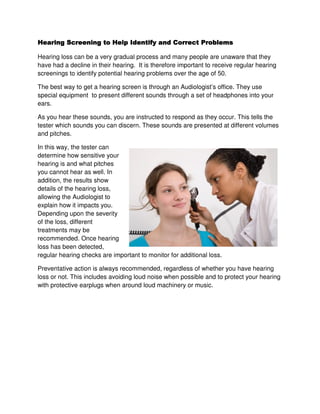
Hearing screening to help identify and correct problems
- 1. Hearing Screening to Help Identify and Correct Problems Hearing loss can be a very gradual process and many people are unaware that they have had a decline in their hearing. It is therefore important to receive regular hearing screenings to identify potential hearing problems over the age of 50. The best way to get a hearing screen is through an Audiologist’s office. They use special equipment to present different sounds through a set of headphones into your ears. As you hear these sounds, you are instructed to respond as they occur. This tells the tester which sounds you can discern. These sounds are presented at different volumes and pitches. In this way, the tester can determine how sensitive your hearing is and what pitches you cannot hear as well. In addition, the results show details of the hearing loss, allowing the Audiologist to explain how it impacts you. Depending upon the severity of the loss, different treatments may be recommended. Once hearing loss has been detected, regular hearing checks are important to monitor for additional loss. Preventative action is always recommended, regardless of whether you have hearing loss or not. This includes avoiding loud noise when possible and to protect your hearing with protective earplugs when around loud machinery or music.
